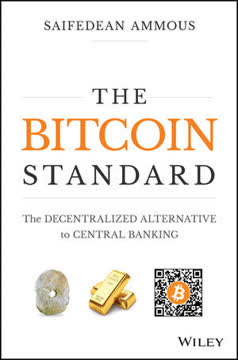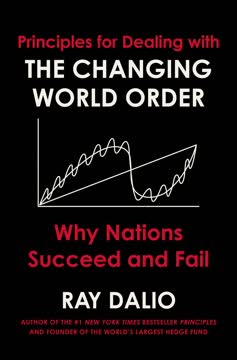Key Takeaways
1. The Information Revolution will transform society and power structures
The Information Revolution will destroy the monopoly of power of the nation-state as surely as the Gunpowder Revolution destroyed the Church's monopoly.
Paradigm shift. The Information Age represents a fundamental transformation in human society, comparable to the Agricultural and Industrial Revolutions. It will reshape political and economic structures by altering the logic of violence and the nature of commerce. The ability to create and protect assets in cyberspace will undermine traditional state power.
New logic of power. Information technology decentralizes power by lowering transaction costs and enabling encrypted communication and commerce beyond state control. This erodes the ability of governments to tax and regulate, shifting power to individuals and non-state entities. The state's monopoly on force becomes less relevant as wealth moves into the digital realm.
Key drivers of change:
- Encryption and digital currencies
- Global communications networks
- Automation and artificial intelligence
- Decentralized commerce and finance
2. Nation-states will decline as sovereignty becomes commercialized
We believe that as the age of individual economic sovereignty is coming. Just as steel mills, telephone companies, mines, and railways that were once "nationalized" have been rapidly privatized throughout the world, you will soon see the ultimate form of privatization—the sweeping denationalization of the individual.
Competitive sovereignty. The nation-state system that has dominated for centuries will break down as individuals gain more choice in governance. Sovereignty will become commercialized, with jurisdictions competing to attract citizens/customers by offering the best value proposition. This will lead to a proliferation of smaller political entities.
Devolution of power. Large nations will fragment into smaller jurisdictions, city-states, and private communities. These will cater to different preferences and specialize in providing specific services. The ties of nationality will weaken as people identify more with transnational affinities and interests. Citizenship will evolve into a form of customized contract for services.
Emerging forms of governance:
- Charter cities and special economic zones
- Transnational affinity groups and virtual communities
- Privatized governance services
- Voluntary associations based on shared values
3. The cybereconomy will emerge beyond government control
Cyberspace transcends locality. It involves nothing less than the instantaneous sharing of data everywhere and nowhere at once.
Borderless commerce. The emerging cybereconomy will operate largely outside the control of nation-states. Digital technologies enable seamless global transactions and asset protection beyond physical jurisdictions. This creates an unprecedented realm of economic freedom and opportunity.
New economic logic. The cybereconomy functions according to different rules than industrial economies. It is characterized by increasing returns, network effects, and dramatically lower transaction costs. Value creation shifts from manipulation of physical resources to information and ideas. Location becomes far less relevant for many forms of economic activity.
Key features of the cybereconomy:
- Cryptocurrency and blockchain-based finance
- Virtual marketplaces and digital goods
- Remote work and digital nomadism
- Automated smart contracts and decentralized organizations
4. Technology will enable the rise of "Sovereign Individuals"
The Sovereign Individual of the new millennium will no longer be an asset of the state, a de facto item on the treasury's balance sheet.
Individual empowerment. Information technology dramatically enhances the capabilities of individuals, allowing them to operate on a scale previously reserved for large organizations. This creates a new class of highly mobile, financially independent "Sovereign Individuals" who can opt out of traditional state control.
Shifting power dynamics. As individuals gain more autonomy and bargaining power relative to states, the relationship between citizen and government fundamentally changes. Sovereign Individuals can shop for jurisdictions, only paying for services they want. This forces states to become more responsive to their "customers" or risk losing them.
Characteristics of Sovereign Individuals:
- High income/wealth from information economy work
- Global mobility and multiple residences/passports
- Use of encryption and offshore financial services
- Customized governance and protection arrangements
5. Income inequality will increase within countries but decrease globally
The Information Age will be the age of upward mobility. It will afford far more equal opportunity for the billions of humans in parts of the world that never shared fully in the prosperity of industrial society.
Shifting distributions. The Information Age will lead to more unequal income distributions within countries as skills and cognitive abilities become more economically valuable. However, it will reduce inequality between countries by creating more opportunities for talented individuals anywhere to participate in the global economy.
New success factors. In the industrial era, accident of birth location was a key determinant of income. In the Information Age, innate abilities and skills matter more. This creates more meritocratic outcomes globally but also leaves behind those lacking valued skills. Social tensions may increase in formerly rich countries.
Impacts on different groups:
- High-skilled knowledge workers: ↑ income and opportunities
- Low-skilled workers: ↓ income and job security
- Developing world talent: ↑ access to global markets
- Industrial-era middle class: ↓ relative status and security
6. The nature of work and organizations will fundamentally change
In the Information Age, a new "transnational" or "extranational" understanding of the world and a new way of identifying one's place in it await discovery in the new millennium.
End of employment. Traditional jobs and career paths will largely disappear. Work will become more task-oriented, with individuals operating as independent contractors in a global marketplace. Organizations will become more fluid, assembling teams for specific projects rather than maintaining permanent workforces.
New organizational models. Rigid corporate hierarchies will give way to flexible networks and decentralized structures. The boundaries between firms and markets will blur. Digital platforms will enable new forms of coordination and collaboration across distances. Virtual and augmented reality will create new work environments.
Emerging work/organizational trends:
- Gig economy and freelancing platforms
- Remote/distributed teams and digital nomads
- Automation of routine cognitive and manual tasks
- Decentralized autonomous organizations (DAOs)
7. A nationalist-Luddite reaction will emerge but ultimately fail
We expect to see a fierce and indignant resistance to the Information Revolution, notwithstanding its great promise to liberate the future.
Backlash inevitable. The disruption caused by technological change will provoke a strong negative reaction, especially from those who benefited from industrial-era arrangements. This will manifest as a resurgence of nationalism, protectionism, and attempts to restrict new technologies. Violence and social unrest are likely.
Ultimately futile. While the reaction may slow the pace of change in some areas, it cannot stop the overall transition. The economic and technological imperatives are too powerful. Jurisdictions that embrace change will prosper, creating irresistible examples. The benefits of the new order will eventually become apparent even to skeptics.
Likely forms of resistance:
- Anti-globalization and anti-immigration movements
- Attempts to restrict/regulate the internet and encryption
- Populist politics blaming elites/foreigners for economic pain
- Neo-Luddite attacks on technology and infrastructure
8. New forms of digital money will end government monetary control
The new digital gold will overcome many of the practical problems that inhibited direct use of gold as money in the past.
Monetary revolution. Cryptocurrencies and other forms of digital money will end government monopolies on currency issuance and control. This will eliminate a key lever of state power and a major source of revenue through inflation. Private currencies will compete based on stability and features.
Economic impacts. The end of manipulated fiat currencies will lead to more honest pricing and stable storing of value. It may cause significant short-term disruption as government finances are squeezed. In the long run, it will create a more efficient and transparent financial system resistant to political meddling.
Implications of digital money:
- End of government-driven inflation and financial repression
- More stable long-term contracts and planning
- Reduced ability to fund government through monetary expansion
- New forms of micropayments and programmable money
9. Protection and security will be privatized in the Information Age
The cybereconomy provides just such an alternative. No government will be able to monopolize it. And the information technologies comprised by it will provide cheaper and more effective protection for financial assets than most governments ever had reason to provide.
Security redefined. As wealth moves into cyberspace, physical protection becomes less relevant. New forms of digital security, like unbreakable encryption, become paramount. This shifts the balance of power away from states with their monopoly on physical force towards those who can provide cybersecurity.
Market for protection. Security and dispute resolution will increasingly be provided by private entities operating in a competitive marketplace. This may include both digital services and physical protection in the form of private communities and security firms. Quality of protection will vary based on what customers are willing to pay.
Emerging protection services:
- Cryptographic asset protection
- Smart contract enforcement
- Private arbitration systems
- Gated communities and private security forces
10. The transition will be disruptive but ultimately beneficial for humanity
The fact that developments embracing the whole globe are commonly described as "international" shows how deeply the nationalist paradigm has penetrated into our way of conceiving the world.
Short-term pain, long-term gain. The transition to the Information Age will involve significant disruption and hardship for many. However, the ultimate result will be a quantum leap in human freedom, prosperity, and potential. The new technologies and social structures will unleash creativity and remove artificial barriers to human flourishing.
Paradigm shift required. Fully grasping and adapting to the new reality requires fundamentally rethinking many aspects of how we organize society. Old mental models based on nationality, centralized institutions, and geographic limitations must be discarded. New ways of conceiving identity, community, and governance need to be developed.
Key benefits of the transition:
- Increased individual autonomy and self-determination
- More efficient allocation of resources and talent globally
- Explosion of innovation freed from institutional constraints
- Reduction in large-scale violence and oppression
Last updated:
FAQ
What's The Sovereign Individual about?
- Transition to Information Age: The book explores the shift from the Industrial Age to the Information Age, focusing on how technology, especially microprocessing, will transform society and governance.
- Megapolitical Analysis: It introduces "megapolitics," analyzing the forces that drive historical change, particularly the dynamics of violence and power.
- Rise of Sovereign Individuals: The authors argue that individuals will gain unprecedented autonomy and financial independence, leading to a decline in the power of nation-states.
Why should I read The Sovereign Individual?
- Understanding Future Trends: The book offers insights into the future of governance and individual autonomy, essential for those interested in societal evolution.
- Historical Context: It draws parallels between past societal transformations and current trends, aiding readers in understanding technological implications.
- Practical Advice: The authors provide strategies for navigating the Information Age, emphasizing adaptation to new economic realities.
What are the key takeaways of The Sovereign Individual?
- Decline of Nation-States: The book posits that nation-states will lose relevance as individuals gain power through technology and decentralized systems.
- Individual Sovereignty: It emphasizes the opportunity for individuals to achieve financial independence and autonomy, reshaping social structures.
- Technological Impact: Advancements in technology, particularly AI and cryptography, will redefine economic and political landscapes.
What are the best quotes from The Sovereign Individual and what do they mean?
- “The future is disorder.”: This suggests that upcoming changes will disrupt established norms, leading to a chaotic but potentially liberating environment.
- “The modern phase of Western civilization will end.”: Reflects the belief that current societal structures are unsustainable and will be replaced by new forms.
- “The liberation of a large part of the global economy from political control will oblige whatever remains of government to operate on more nearly market terms.”: Indicates that governments will need to adapt to a new reality where they must compete for resources and legitimacy.
How does The Sovereign Individual describe the transition to the Information Age?
- Technological Revolution: The Information Age will be marked by rapid technological advancements altering economic and social structures.
- Shift in Power Dynamics: Predicts a shift from centralized power in nation-states to decentralized power among individuals, facilitated by technology.
- Societal Implications: This transition will lead to increased individual autonomy and a reconfiguration of traditional institutions, including government and economic systems.
What is the concept of "megapolitics" in The Sovereign Individual?
- Definition of Megapolitics: Refers to the analysis of forces shaping power dynamics, particularly the role of violence and technology.
- Historical Context: Understanding these forces is crucial for predicting societal changes, as they have historically dictated the rise and fall of governments.
- Modern Application: The book applies this concept to contemporary issues, suggesting new megapolitical dynamics in the Information Age.
What role does technology play in The Sovereign Individual?
- Catalyst for Change: Technology is the primary driver of societal transformation, especially through advancements in microprocessing and communication.
- Redefining Violence: Technology will change the logic of violence, making it less relevant in the new economic landscape.
- Empowerment of Individuals: Technology will empower individuals, allowing them to operate independently of traditional state structures.
How does The Sovereign Individual view the future of nation-states?
- Predicted Decline: Nation-states will decline in power and relevance as individuals seek personalized governance solutions.
- Emergence of New Jurisdictions: New, smaller jurisdictions will compete for residents by offering attractive governance and tax structures.
- Challenges to Nationalism: As individuals prioritize personal autonomy, emotional ties to nationalism will weaken, altering the individual-government relationship.
What is the significance of "Sovereign Individuals" in The Sovereign Individual?
- Definition: Sovereign Individuals leverage technology to gain autonomy and control over their lives, operating independently of traditional state structures.
- Impact on Society: This new class will challenge existing power dynamics, leading to a reconfiguration of social, economic, and political relationships.
- Future of Work and Economy: The rise of Sovereign Individuals will transform work organization, shifting towards project-based, freelance, and remote work.
How does The Sovereign Individual address the concept of nationalism?
- Critique of Nationalism: Nationalism is seen as a relic that will become irrelevant in the Information Age, often enforcing compulsion and restricting freedom.
- Emergence of Cosmopolitanism: A new cosmopolitan identity will replace traditional national identities, fostering a more interconnected global society.
- Reactionary Nature: As nation-states lose power, there may be a reactionary push to defend nationalist sentiments, potentially leading to conflict.
What are the opportunity costs associated with citizenship as discussed in The Sovereign Individual?
- High Tax Burdens: Remaining in high-tax jurisdictions can significantly diminish lifetime wealth, with high taxes leading to substantial financial losses.
- Limited Personal Freedom: Citizenship often comes with restrictions that limit personal and economic freedom, advocating for relocation to more autonomous jurisdictions.
- Economic Inefficiency: The traditional model of citizenship is economically inefficient, enforcing a system of compulsion misaligned with the Information Age.
How can individuals prepare for the changes described in The Sovereign Individual?
- Embrace Technology: Individuals should become proficient in technology and adapt to the new economic realities it creates.
- Seek Financial Independence: Achieving financial sovereignty is crucial for navigating the changing landscape effectively.
- Stay Informed: Readers are encouraged to stay aware of societal trends and shifts in power dynamics to make informed decisions about their futures.
Review Summary
The Sovereign Individual receives mixed reviews. Many praise its prescient predictions about technology, cryptocurrencies, and societal changes, calling it thought-provoking and insightful. Critics argue it promotes a dystopian future favoring the wealthy elite while neglecting social responsibility. Some find the writing style dry and overly verbose. Readers appreciate the book's foresight on topics like the gig economy and digital nomadism but question its stance on nationalism and equality. Despite its flaws, many consider it an important read for understanding potential future trends.
Similar Books









Download PDF
Download EPUB
.epub digital book format is ideal for reading ebooks on phones, tablets, and e-readers.




